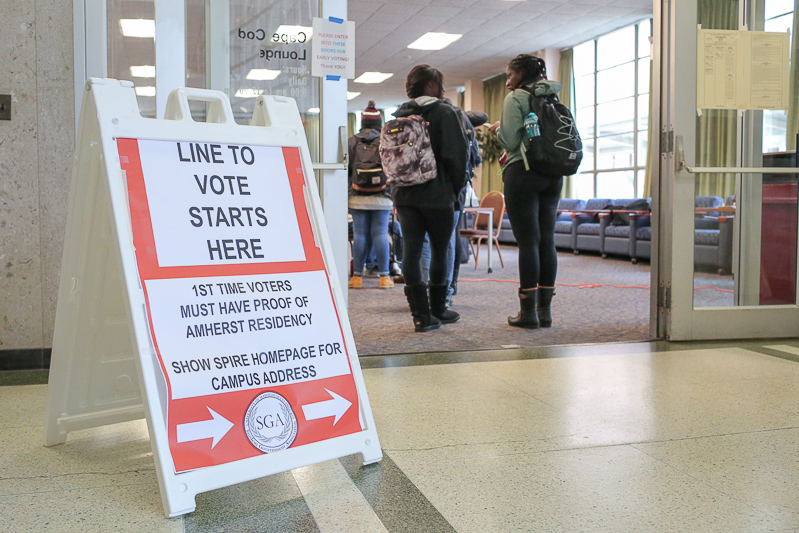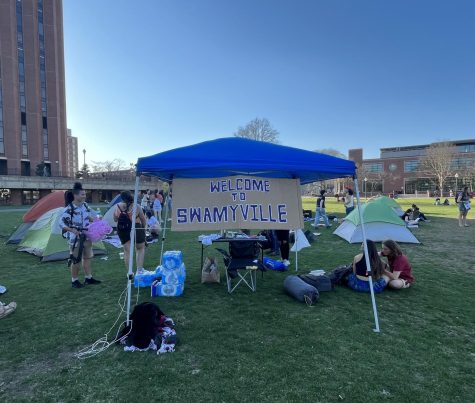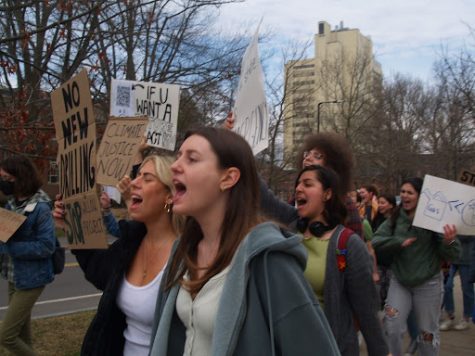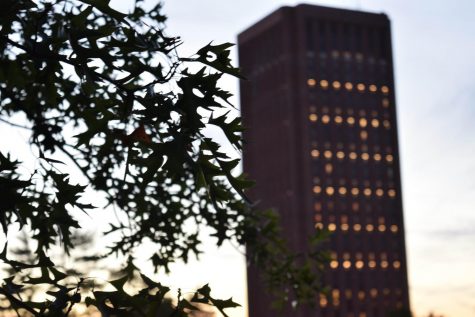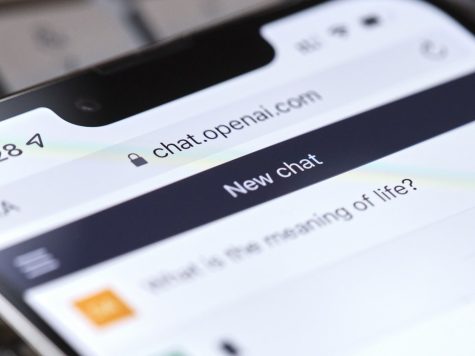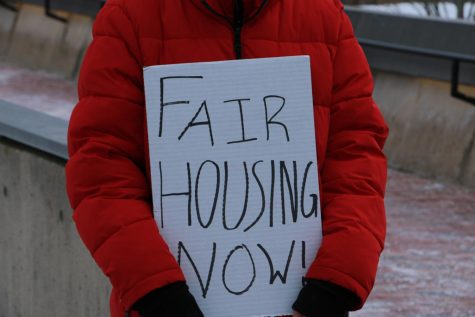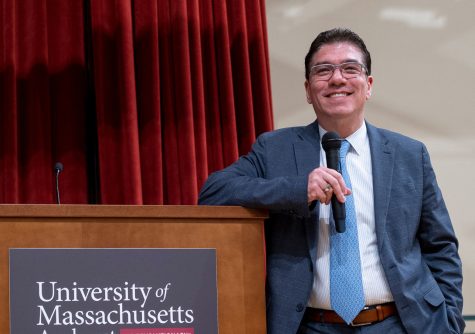Party loyalty and morality tie up voters in 2016 election
Whether U.S. voters like it or not, the two-party system forces voters to choose between two major party candidates who have some of the highest unfavorability ratings in recent history.
According to Real Clear Politics, Hillary Clinton has a 53.4 percent unfavorability rating, while Donald Trump has a 59 percent unfavorability rating.
In May 2016, the Associated Press-National Opinion Research Center (NORC) for Public Affairs Research found 70 percent of Americans feel “frustrated” with the 2016 presidential election.
Voters have to choose between remaining loyal to their party, or picking a candidate who best represents their morals.
The bipartisan divide
Jacob Rose, a University of Massachusetts Amherst alum who graduated this past February, said he understands the frustration many voters are feeling this election cycle due to the limited options of candidates.
“The fact that we know so many negatives about each candidate, and so many people I take it are just not okay with either of them but feel trapped, feel afraid,” Rose said. “There are a lot of emotions going on in people’s decisions.”
Trump’s sexual assault allegations, as well as a tape released of him saying vulgar things about women to Billy Bush on the set of “Days of Our lives,” has many voters upset — especially Republican women.
Alexandra Gearty, president of the UMass Amherst Republican Club, said there needs to be a turning point in the Republican Party.
“It is causing moderate Republicans and moderate conservatives to think about voting for Hillary,” Gearty said. “Obviously as the Republican Party, they do not want people voting Democrat.”
On the other hand, voters show concern about Clinton’s untrustworthiness and the FBI’s recent investigation of evidence involving Clinton’s use of a private email server.
Zachary Albert, a UMass political science graduate student, said the political polarization seen today started to grow in the 1980s. He explained that political polarization grew between both parties when they started to adopt issues from outside groups.
Then, there was Supreme Court case involving Citizens United which allowed outside groups furthering political polarization to donate mass amounts of money to whichever candidate they wanted.
In 2008, the conservative Citizens United Political Action Committee aimed to broadcast a film criticizing presidential candidate Hillary Clinton. The Bipartisan Campaign Reform Act made campaigns and corporations unable to spend money that negatively targeted an opposing candidate.
The group decided to challenge the law. In the 2010 case Citizens United v. Federal Election Commission, the Supreme Court, in a 5-4 ruling, stated the restrictions as unconstitutional. Since then, it allowed corporations and other nonprofits the ability to spend as much money as they want to convince people to vote for or against a certain candidate.
Albert said the Citizens United case drastically changed the way campaigns and elections attain funding. He said because of this money, outside groups are able to push for the candidates they want to see elected that represent their interests and values.
The Koch brothers planned to spend $900 million on the 2016 election, according to The New York Times. While the National Nurses United union spent over $1.7 million in support of his campaign.
“[Citizens United] allowed outside groups to influence candidates, to contribute to candidates in a different way, so even more amounts of money [was] flowing from these outside groups,” Albert said.
The issues these big corporations tackled left out the everyday blue-collar workers and people of the middle class. At this point, corporations began holding their influence over candidates to represent their concerns, as opposed to the concerns of voters.
“This polarization that has occurred and this influence of outside groups, these groups have an issue that they really care about and try to get candidates to adopt,” Albert said. “There are not a lot of groups that are advocating for blue collar workers or the poor, things like that, so those issues have tended to take a back seat over time.”
This leaves many politicians using donor money after they are elected to secure their seat in the next election by using this money to run re-election campaigns. Political progress halted.
The New York Times reported only 9 percent of American voters chose Clinton and Trump as the nominees in the primaries.
On the other hand, Casey Pease, a former Bernie Sanders field organizer and a member of the UMass Amherst Democrats, said people should not leave the political conversation.
“The thing that cannot happen is that we start to understand the problems that need to be fixed in our politics, but because we have two nominees most people do not like anyway, we get turned off,” Pease said.
In order for progress, Pease believes we must acknowledge the choices we have and show up to the ballot box.
“That should make people want to get involved more because at a certain point we allowed ourselves to get to this point,” Pease said.
Independent Voters
As of February 2016, roughly 35 percent of Massachusetts voters were registered Democrats. Eleven percent were registered Republicans and 53 percent of voters registered as unenrolled.
Of the registered voters in the U.S., 27 percent of voters are registered Republicans, 32 percent are registered Democrats and 40 percent are registered independents, according to a Gallup poll.


More people are opting out of pledging red or blue because they do not feel the parties represent their values.
“[The Democratic party] clearly demonstrated that they do not care about my vote, so I am not going to subscribe to their party,” said Rose.
Currently registered as a Democrat, Rose said he plans to change his voter status to either independent or Green Party after the election. He believes that neither the Republican or Democratic Party represent his concerns as a voter, but rather “the people who pay for them to run,” Rose said.
In November, Rose plans to vote for Green Party presidential nominee Jill Stein. After the Democratic Convention in July, Stein appealed to progressive Bernie Sanders supporters as a viable option.
Third party candidates like Jill Stein of the Green Rainbow Party and Gary Johnson of the Libertarian Party are alternative options for voters who dislike the bipartisan nominees.
“[Third parties] are definitely going to get a higher percentage than they normally do, because of the two candidates we have. Hillary and Trump both have qualities people strongly dislike,” said Gearty.
The Commission on Presidential Debates (CPD) ruled that in order to be included in debates, a candidate must reach a 15 percent level of support nationwide to share the stage with Republicans and Democrats.
Stein and Johnson polled less than 10 percent each.
Ross Perot ran as an independent candidate in 1992 and was the first and only third party candidate the CPD let into the debates.
This exclusion often leaves out these third party candidates from speaking on issues and sharing their platform to a wider audience of voters.
“I would have liked to see Gary Johnson and Jill Stein in at least one of the debates. Maybe if we are trying to give third parties a little bit more of a say, that is one reform that we can make,” Albert said.
Third parties, Albert said, bring alternative issues that don’t usually get coverage to the table for mainstream parties to pick up once that issue has enough support.
The Personal is Political
Liana Ascolese, president of the UMass Amherst Democrats, said that people’s individual identities shape their political beliefs within the two-party system.
“What politics is about, it has become so personal, it has become too wrapped up, which I think is a good thing. So wrapped up in our identities and who we are and how we live our lives,” she said. “When you are having a political conversation, you are also having a personal conversation.”
Ascolese said she understand how the controversies within politics and picking the next president affects people’s everyday lives.
“Our politics reflect our values and it is hard to compromise on politics when it is wrapped up in who you are and how you live your life day to day and how you interact with government and even what rights you have,” Ascolese added.
This presidential election continues to divide the country, not only between choosing Clinton or Trump but whether or not to remain loyal to the voter’s political party.
Some Republicans are choosing to not support their party’s candidate, such as George W. Bush, Mitt Romney and Colin Powell on the Republican side.
Powell said he will be voting for Clinton and referred to Trump as “a national disgrace and an international pariah.”
Robert Satiacum, a Democratic elector in Washington state, said he will not vote for Clinton even if she wins the popular vote on Tuesday.
Gearty has yet to make her ballot decision but said at times it can be frustrating to navigate the space of being a Republican and a woman. Raised in a conservative Republican family, Gearty said she sometimes faces backlash for being a conservative on a liberal College campus.
“I’ve just been asked so many times, ‘As a woman how can you be a Republican? As a Republican why don’t you believe in this?’” she said.
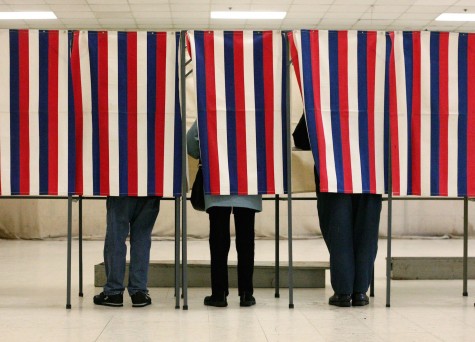
Solutions Moving Forward
Despite the disapproval of the bipartisan system, solutions to voting processes can help create a new model where voter’s voices are better heard.
Ranked Choice Voting allows people to rank up to three candidates in order of preference when filling out their ballots, instead of just picking one candidate. This year voters in Maine will decide whether or not to approve Ranked Choice Voting in their state.
“I personally think there needs to be ranked voting. I think that right now the way in which we elect people is not representative of what people want,”said Pease.
This type of voting ensures that the candidate with the most votes and support wins the election.
“Ranked Choice Voting does nothing but liberates people’s votes,” said Rose.
Another idea, Albert said, looks to target the issue of big money in politics.
“Give out vouchers to individuals so they can send those to the candidate that they prefer,” Albert said. “That gives some choice and some agency to people that might not otherwise be involved in politics, and increases the influence of the everyday person rather than the partisan activist.”
These vouchers, funded by the government, are called Democracy Vouchers. They focus on campaign finance reform by giving power back to the voters through a certain amount of money to donate to candidates or campaigns that align with their beliefs.
Another way to change the political landscape is becoming active and involved in the political process.
“If we want to go from no longer a two-party system to maybe one where we can include third parties, to get to that step, you have to be involved, you have to vote,” said Pease.
For the people who do not subscribe to a Republican or Democratic political ideology, Ascolese said there are different ways to get involved.
“Find an issue that you care about. If you do not identify with the Democratic Party or the Republican Party, that is fine, but maybe you really care about climate change so go find a local group that cares about climate change and volunteer with them,” she said.
Issue voting allows voters to choose a candidate based on political issues. Danielle Glover, vice president of the Young Democrats of America, said she sees the Democratic Party focusing on issues in the future.
“We talk about climate change and we talk about college affordability, and we talk about equal pay, those are Democratic values but those resonate with people who are unaffiliated or independent voters and that is how we reach out to them, by talking not just about party loyalty but about issue solutions,” said Glover.
On Jan. 20, 2017, the United States will inaugurate their next president.
However, the decisions do not stop there.
“Even if the people do not like the candidates as much as in years before, I think that we have to remember that it is more than one person and that we have to be voting all the way up and down the ticket to ensure we see the policy changes that we want to see,” said Glover.
Email Carson McGrath at [email protected] or follow her on Twitter @McGrathCarson.

